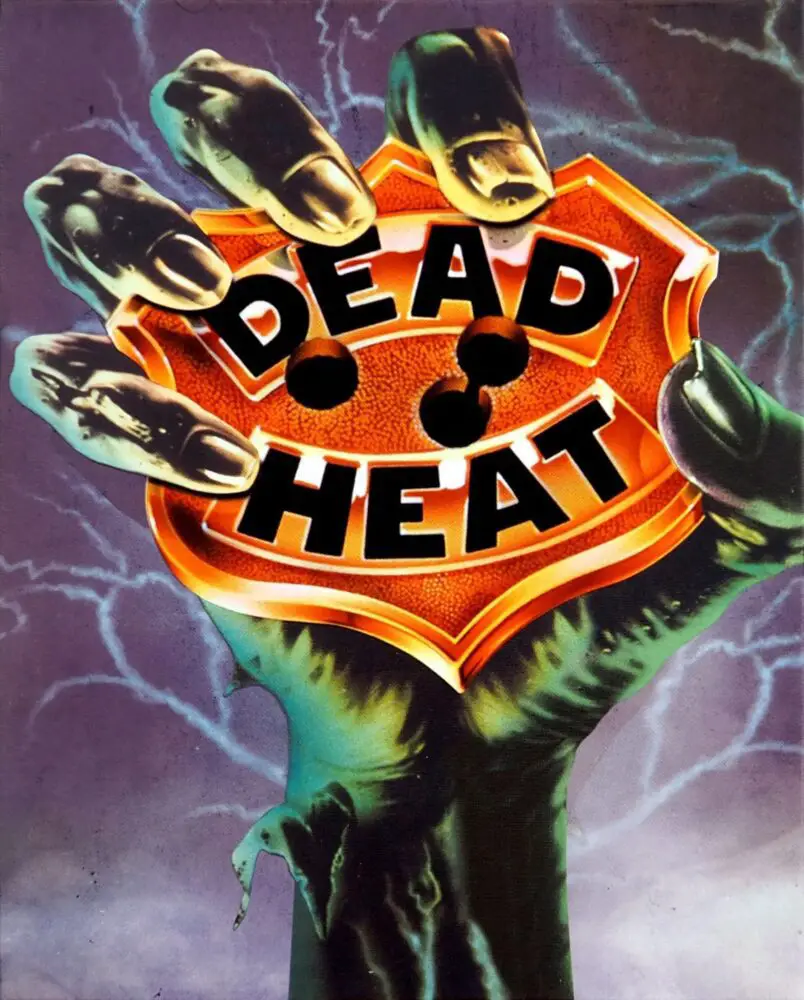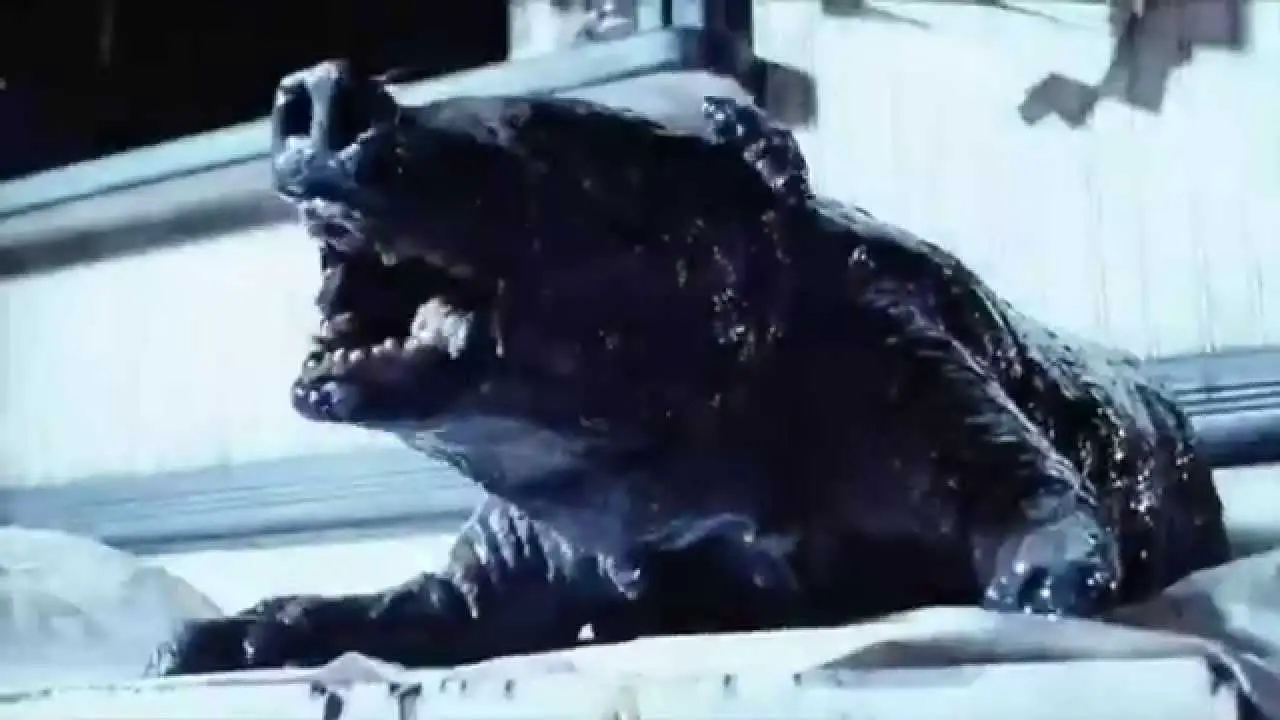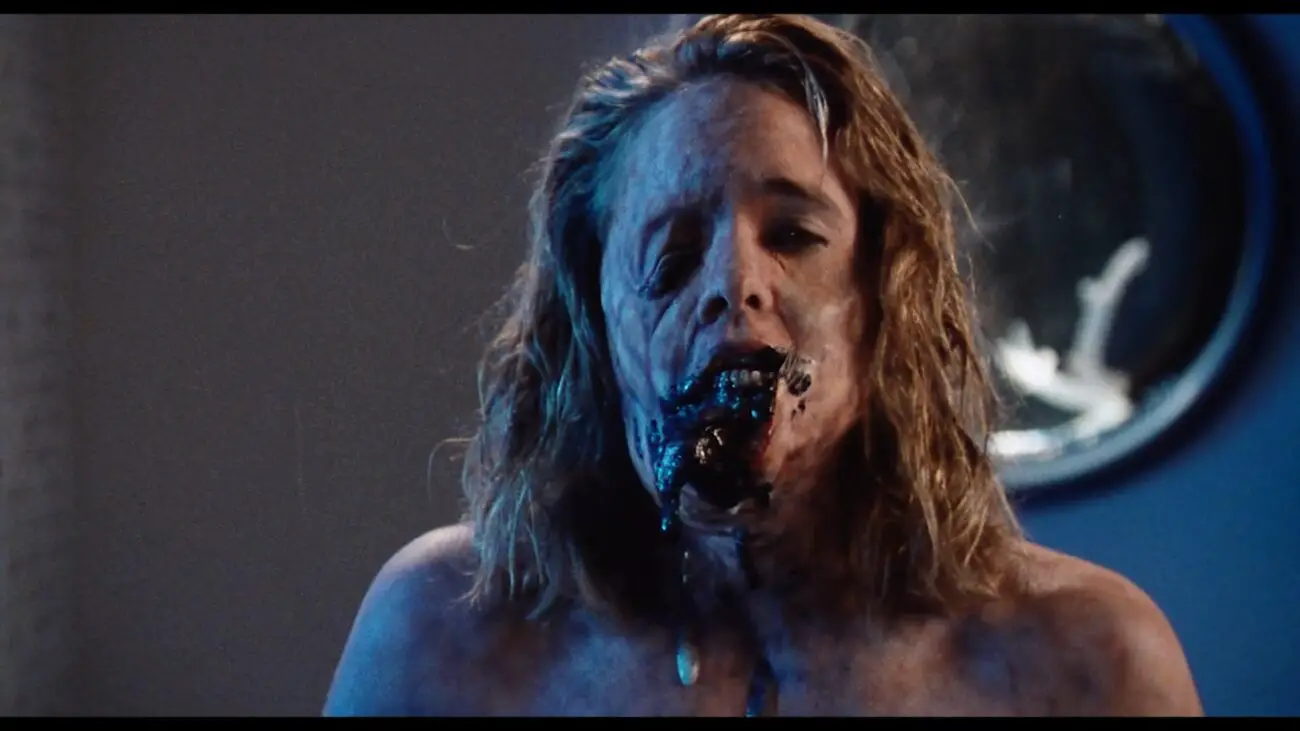Welcome to my column dedicated to the appreciation of physical media supplements called: Feature Presentations. The goal of this column is not to say whether a film is good or bad and worth picking up or not—I would like to highlight the discs that go the extra mile and provide film fans with enough tasty tidbits to satisfy even the hungriest of cinephiles. With all that out of the way, today’s article will focus on Vinegar Syndrome‘s release of Dead Heat.
Ah, the buddy-cop genre where you stick two polar opposites together and let the hilarity commence! Pairing up two mismatched characters offers the potential for classic films such as Lethal Weapon or 48 Hrs—but there’s also the risk of ending up with cinematic trash such as Lethal Weapon 4 or Another 48 Hrs. Usually, these films have the same tropes: one is neat while the other is messy, or one is by the book, and the other shoots from the hip. It’s tried and true, but this week’s film I will be diving into changes it up: one’s living, and the other is dead!
Starring Treat Williams and Joe Piscopo—wait, come back! Dropping those actors can be frightening for some, so I should have eased you in a bit. Dead Heat follows two cops on the trail of zombies loose in Los Angeles. When one becomes part of the undead, action, comedy, and horror come together in a weird mix that, in my opinion, doesn’t come quite together. It’s not a terrible movie, but the way the film comes together struggles to mesh the genres and plays off as a missed opportunity.
While I may not love the movie, many people do. Many Dead Heat fans jumped for joy when Vinegar Syndrome announced that this 1988 film would get a loving physical media release. And not just any release, a two-disc, 4K UHD/Blu-ray combo pack!
Dead Heat comes with a cardboard slipcover with newly-designed artwork. The disc has a reversible art wrap that features two choices of theatrical art designs.
The 4K disc contains an archive audio commentary featuring director Mark Goldblatt, screenwriter Terry Black, and producers Michael L. Meltzer and David Helpern. All commentators are recorded together and share a general enthusiasm around the film. Each takes turns recounting production details and film factoids, including shooting an effect-heavy movie on a tight budget. While the commentators occasionally talk over each other, it’s an entertaining commentary track that balances entertainment and film knowledge.
The bulk of the bonus features rests on the Blu-ray disc. Along with the commentary, Vinegar Syndrome includes the new interview with Mark Goldblatt, “The Building Blocks of Movies.” Goldblatt breaks down how he came to work in film, including his career upbringing through the works of Roger Corman, running through the cast and crew, and the disappointing initial reception followed by its resurgence as a cult film. I found this interview insightful as Goldblatt takes a measured approach to discussing Dead Heat and fills the interview with plenty of production information.
“A Thousand Feet of Lightning” is an interview with visual effects artist Ernest Farino. Farino speaks down-to-earth when discussing his career and time on set for Dead Heat. He discusses working with James Cameron, his prior relationship with Mark Goldblatt, the technical challenges of working with optical effects, and his missed opportunity with Treat Williams. Farino’s comments may play a bit dry to others, but, like “The Building Blocks of Movies,” this was a well-paced and detailed interview.
“Seizing the Opportunity” is a discussion with second unit director Patrick Read Johnson. Whereas the earlier interviews discuss Dead Heat in-depth, “Seizing the Opportunity” is a brief snippet from a separate, lengthier interview with Patrick Read Johnson. The snippet on the disc has Johnson discuss how he came to Hollywood, worked his way up, and directing the butcher chop scene in Dead Heat. It’s brief but informative.
“How to Edit for an Editor” finds Harvey Rosenstock discussing his time on set and working hand-in-hand with Mark Goldblatt. Rosenstock briefly touches upon his influences in editing before diving deep into his work on Dead Heat. There are hints at friction as Rosenstock details the challenges of working with Goldblatt, who began his career as an editor. Rosenstock talks about how two editing creatives on one project led to minor disagreements and the resulting film, in his words, being co-edited by himself and Goldblatt. Coming out of the film, Rosenstock speaks highly about his time on the film’s production and explains that working with Goldblatt offered plenty of filmmaking experience.
Composer Ernest Troost is the focal point of the audio-only interview, “Happy Accidents Happen.” Troost discusses his approach to the film’s score, influences, and snippets from the Dead Heat score and other films that impacted Troost. It’s short and sweet with little nuggets of details over its scant runtime.
“Dead and Alive” is an archival interview from Red Shirt Pictures and 88 Films with makeup effects creator Steve Johnson. Johnson runs through the makeup scenes for Dead Heat, creating a life cast of Vincent Price, why he’s a vegetarian, and influences. Johnson does make jokes at the film’s expense in jest but has a fondness for his and his team’s work on the movie.
Vinegar Syndrome includes a handful of VHS-quality deleted scenes. The lifted scenes play on a reel and offer more makeup scenes and fleshed-out (pun intended) character moments, most notably, the infamous “Deathday sequence.” While it is welcome to see the characters getting more depth, especially Treat Williams’ Roger Mortis, most of the scenes would have slowed the film’s pacing, and removing them proves to be the correct choice.
For the film’s marketing materials, Vinegar Syndrome includes the film’s theatrical trailer and a television spot. An archival EPK featurette comes with the disc featuring on-camera comments from Treat Williams, Joe Piscopo, and Darren McGavin. While a non-essential feature, this is the only glimpse of behind-the-scenes shots and words from the actors. Vinegar Syndrome also provides a MIFED promotional piece, similar to a trailer or sizzle reel. Rounding out the disc is a stills gallery that consists of images from the finished film and promotional shots.
And there you have it! Multiple times, those on the disc mention that you either love or hate Dead Heat. I’m the exception—there’s stuff I like and a bunch I don’t. While revisiting the Vinegar Syndrome 4K didn’t change my opinion of the film, there’s a lot to love with the supplemental material. The disc comes packed to the gills with new and archived features. If there’s a nitpick, there is a substantial lack of participation from the film’s main leads. Minor quibbles aside, one couldn’t ask for much more, and if you’re a fan of Dead Heat, there’s plenty on this disc to savor!



